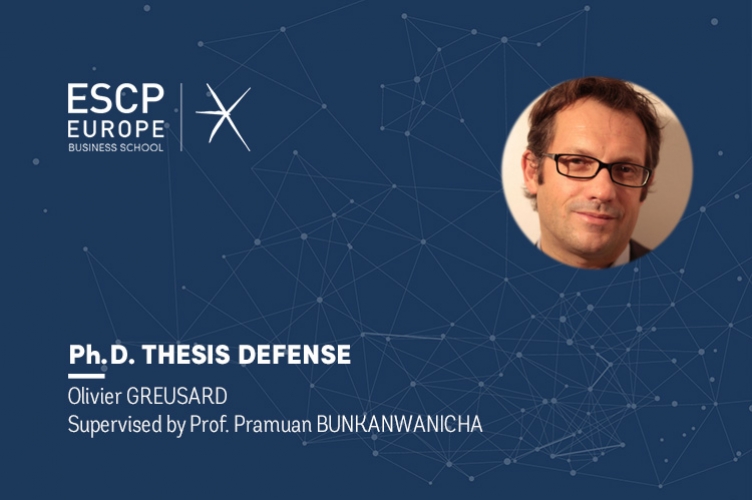9 July 2019 at 2:30 p.m. (CET)
ESCP – Campus République – Room 4310
 Olivier GREUSARD, PhD candidate in the PhD programme ESCP, will publicly defend his PhD thesis in Management Sciences.
Olivier GREUSARD, PhD candidate in the PhD programme ESCP, will publicly defend his PhD thesis in Management Sciences.Anti-Corruption Laws and Firms Behavior: Lessons from the FCPA Enforcement Activity
Jury
Supervisor:
- Prof. Pramuan BUNKANWANICHA,
ESCP
Referees:
- Prof. Gilles CHEMLA,
Université Paris Dauphine / Imperial College London - Prof. Hervé STOLOWY,
HEC Paris
Suffragants:
- Prof. Laurent GERMAIN,
Toulouse Business School - Prof. Philippe TOURON,
Université Paris 1 Panthéon-Sorbonne - Prof. Alberta di GIULI,
ESCP
Abstract
In this thesis, I investigate the direct effect on targeted firms and the indirect effect on peer firms of law enforcement using the cases enforced between 1978 and 2015 under Foreign Corrupt Practices Act (FCPA), the U.S. Anti-Bribery law, as a framework.
I firstly review the literature on earnings management, and more specifically on accrual-based models, to analyse the efficiency of accrual-based models to capture changes in regulation.
In a second paper, I investigate with my co-author the accrual quality of bribe-paying firms and their competitors and find a positive effect of law enforcement on the accrual quality of bribe-paying firms’ competitors, but not the bribe-paying firms. Our results suggest a positive impact of anti-bribery law enforcement that incentivizes other firms to enhance their accounting information once they acknowledge a bribing behavior of a peer following the information risk channel.
In a third paper, I focus on the indirect effect of law enforcement on peer firms and investigate the real economic effects of anti-bribery enforcement on the level of investment of peers. I find that peer firms decrease the level of their investment once they acknowledge the opening of a FCPA investigation in their industry. More surprisingly, I find a weakening in the decrease of investment for the cases acknowledged after December 2004, when the prosecutor used for the first time alternative resolution vehicles to conclude a FCPA case. These results suggest that, beyond the impact of law enforcement itself, the prosecution mode also affects the behavior of peer firms.
In sum, this thesis shows that anti-bribery law enforcement can have a deterrent effect that impacts peer firms, who tend to adapt their behavior in response to a regulatory stimulus.
Location
Organiser: ESCP - Campus Paris
Paris - France
MapDate
Start date: 09/07/2019
Start time: 2:30 PM
End time: 4:03 PM
